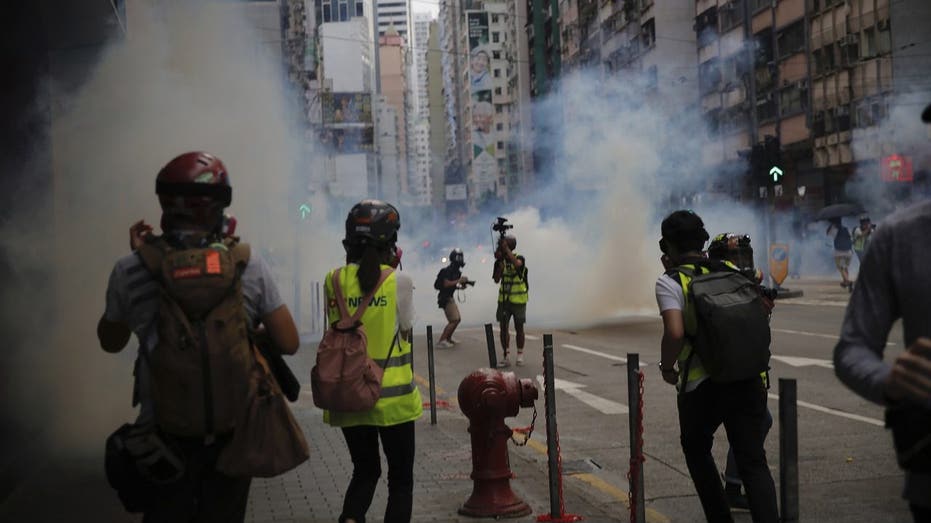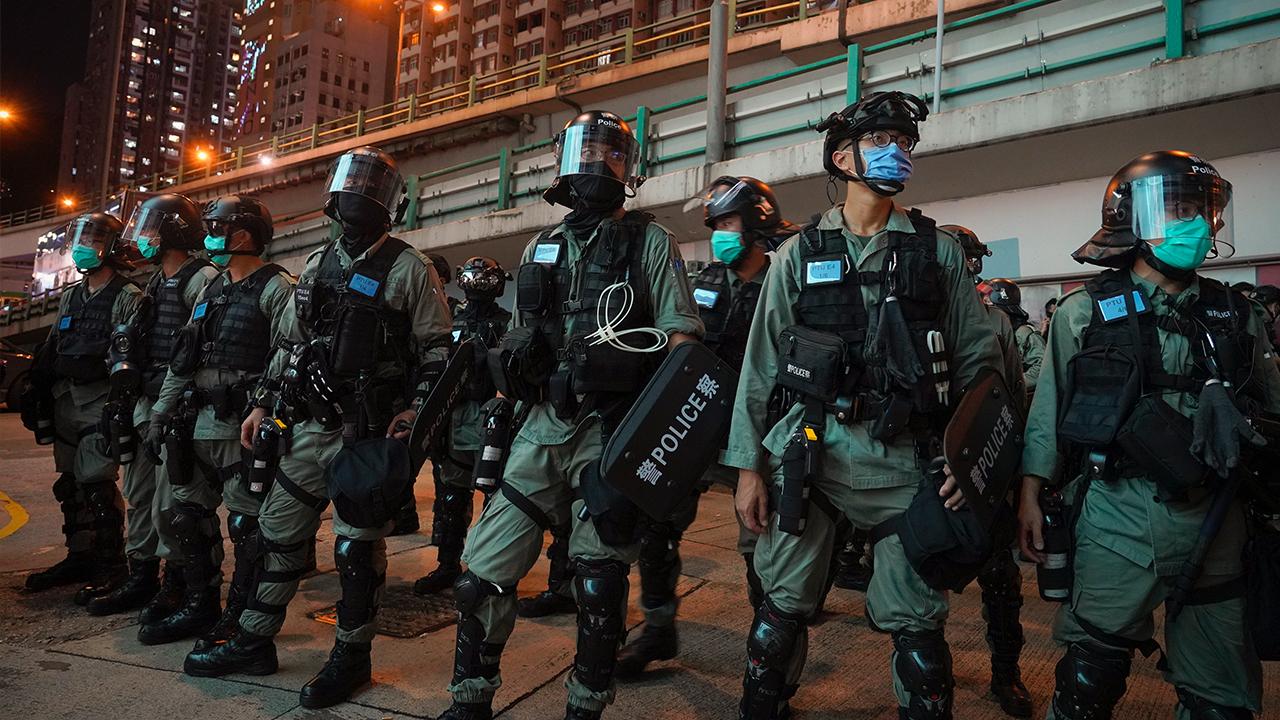Facebook, Twitter, Google face free-speech test in Hong Kong
U.S. technology titans face a looming test of their free-speech credentials in Hong Kong as China’s new national-security law for the city demands local authorities take measures to supervise and regulate its uncensored internet.
Facebook Inc. and its Instagram service, Twitter Inc. and YouTube, a unit of Alphabet Inc.’s Google, operate freely in the city even as they have been shut out or opted out of the mainland’s tightly controlled internet, which uses the “Great Firewall” to censor information.
In Hong Kong many citizens have grown accustomed to freely using their accounts to speak out on political matters, voice support for antigovernment protests, and register their anger at China’s increasing sway over the city.
Now the U.S. tech companies face a high-wire act, analysts say, if authorities here ask them to delete user accounts or their content. Refusal could invite Beijing’s scrutiny and potentially put them at risk of legal action under the new national-security law. Complying would alienate longtime users in the city, some of whom continue to speak out on their platforms, and leave the companies open to criticism from politicians in the U.S. or U.K.
Among the tech giants, Twitter said in a statement it “has grave concerns” about the law and is “committed to protecting the people using our service and their freedom of expression.” Twitter said it is reviewing the new rules, “particularly as some of the terms of the law are vague and without clear definition.”
CHINA, PRO-BEIJING ACTIVISTS CONDEMN HONG KONG 'MEDDLING'
Measures to better supervise the internet and foreign media were provisions tucked into China’s national-security law for the city. The law criminalizes activities in four vaguely defined areas covering secession, subversion, terrorism and collusion with foreign forces.
“Tech companies will absolutely receive more requests to remove information that is allegedly harmful to national security from the relevant authorities,” said Haochen Sun, a law professor at the University of Hong Kong. He said companies will face difficulties especially with borderline cases, such as potential requests to remove songs, for instance, that protesters have used in antigovernment demonstrations.
Among provisions in the law, which came into effect Tuesday, is a mandate that Hong Kong authorities “strengthen supervision” and regulation over the internet. In China, that language from Beijing typically means restricting political speech.
CHINA'S NATIONAL SECURITY LAW COULD PROMPT COMPANIES TO RETHINK HONG KONG HEADQUARTERS, ROSS SAYS
Facebook and Twitter “might see their popularity in Hong Kong shrink dramatically,” said Sandra Marco Colino, law professor at the Chinese University of Hong Kong. Protesters have used the platforms widely to voice their opinions and even coordinate some activities, she said. But the “stiff penalties that might be imposed will almost certainly discourage publicly sharing such views.”

Riot police form a line as they plan to clear away people gathered in the Causeway Bay district in Hong Kong on Wednesday, May 27, 2020. (AP Photo/Vincent Yu)
The national-security law appears to have already triggered a wave of self-censorship as fears rise over the punitive scope of the new rules. Days before the law was passed, a number of social-media users deleted their accounts or wiped them of protest-related content.
A Facebook spokeswoman said the company is reviewing the details of the law. “We believe that freedom of expression is a fundamental human right, and share concerns about the impact of this law on free expression in Hong Kong,” she said.
HONG KONG POLICE MAKE ARRESTS UNDER NEW SECURITY LAW
Facebook and Twitter declined to say if they have received any instructions from authorities related to the new law. A Google spokeswoman declined to comment.
Google and Apple Inc. last year pulled from their digital stores some apps associated with Hong Kong’s antigovernment protests. Apple removed a crowdsourced map service that permitted demonstrators to monitor police activity after the Chinese Communist Party-run People’s Daily newspaper called the app “toxic software.” Apple said it pulled the app due to concerns it endangered law enforcement and residents.
Google took down a mobile game that let users role-play as Hong Kong protesters, with the company saying at the time it violated a policy prohibiting developers from “capitalizing on sensitive events such as attempting to make money from serious ongoing conflicts or tragedies through a game.”

Members of the media take cover as police fire tear gas during a protest against Beijing's national security legislation in Causeway Bay in Hong Kong on Sunday, May 24, 2020. (AP Photo/Kin Cheung)
In mainland China, U.S. tech companies have in the past been criticized for complying with Beijing’s demands. In 2007, Yahoo faced a congressional hearing after the company handed information about Chinese journalist Shi Tao to local authorities, who later arrested him. Professional networking site LinkedIn, too, has fielded anger over its censorship of politically sensitive posts in mainland China.
Home to 7.5 million people, Hong Kong is a source of less digital advertising revenue than more populous countries, but its citizens are richer and more digitally savvy than in many places. Some 91% of Hong Kong’s population uses the internet, according to consulting firm We Are Social, and 98% of internet users between the ages of 16 and 64 take to social media or messaging apps.
TRUMP ADMINISTRATION WARNS US BUSINESSES ON CHINA OPERATIONS, CITING HUMAN RIGHTS ABUSES
Facebook in the last six months of 2019 received 241 government requests for data on users in Hong Kong, according to a company report. Twitter received three requests for information on users during the first six months of last year, the latest period for which company data is available, among the lowest in the world.
Google’s presence in China is relatively small, as services like search, Gmail and YouTube are blocked. Twitter and Facebook are also blocked in China. But the country is a critical market for Apple, accounting for a substantial portion of its revenue. U.S. tech companies typically say they must abide by local laws in the countries in which they operate.

Hong Kong's Chief Executive Carrie Lam, center, toasts with guests following the flag-raising ceremony to mark the anniversary of the Hong Kong handover to China, Wednesday, July 1, 2020. .(AP Photo/Kin Cheung)
While analysts said they believe authorities could force social-media platforms to remove content, analysts don’t expect a widespread internet shutdown as a result of the new law.
Alp Toker, the director of NetBlocks, a London-based organization that tracks online censorship, said Hong Kong hasn’t seen large-scale internet outages in the past. He said his group hasn’t detected any internet shutdowns in recent days, since the law went into effect.
Ultimately, analysts say, U.S. companies will likely be forced to follow the new rules in Hong Kong if they want their services to be available in the city.
“As long as tech companies operate in Hong Kong, they will have to follow Hong Kong law, national security law included,” said University of Hong Kong’s Mr. Sun.




















